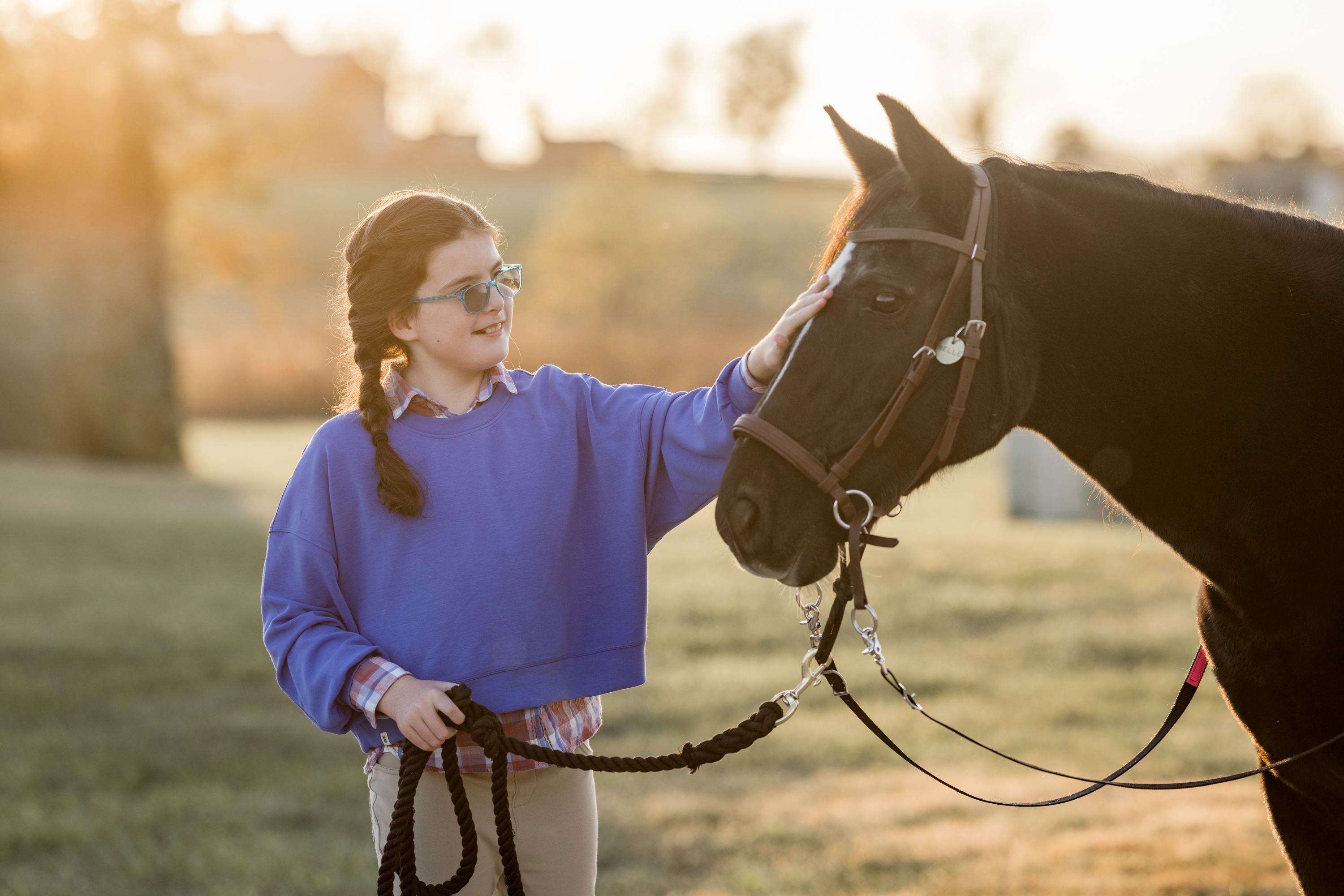2024 Veteran Services Grants
Sambo's Southern Belle (Belle)
Rocky Mountain Horse Mare (2006)
When a veteran named Amber first signed up to participate in the therapeutic horsemanship program at Central Kentucky Riding for Hope (CKRH), she freely admits that because she was scared of horses, she approached the experience with some trepidation. But thanks to the support and patience shown by Belle, an 18-year-old Rocky Mountain Horse, Amber has slowly relearned how to feel safe, build trust, and most importantly-- believe in herself again.
“Belle has been more than a riding companion,” explains Amber. “She has been a gentle yet steadfast support, showing me patience and trust even as I worked through my initial fears and ingrained trauma responses. During our early lessons, I spent much of my time carefully brushing her, often whispering my anxieties aloud to her.
“Through my journey with Belle, I have found healing, resilience, and a renewed ability to work collaboratively—qualities that have enriched my life both inside and outside the CKRH community,” she continues.
Amber is one of 120 active-duty service members, veterans, and their relatives currently involved with mounted and nonmounted therapeutic horsemanship programs at CKRH. Located in the bucolic Kentucky Horse Park, CKRH strives to provide a supportive environment that promotes physical and emotional well-being, while developing essential life skills. In their military programs, particular attention is paid to building resilience, easing the transition to civilian life, and developing new coping strategies.
In some ways, Belle might seem like an unlikely fit for a therapeutic program. Described as an opinionated “boss mare” when out with her friends in the paddock, Belle’s self-confidence and strong personality made her challenging to work with when she first arrived at CKRH two years ago. But with time, patience, and plenty of trail rides, Belle has transformed into a therapeutic partner who brings her strength, protective instincts, and a quiet, calming, energy to her work with clients. Today, she plays a crucial role in CKRH programming, working with children and adults of all ages, abilities, and backgrounds, in both mounted and nonmounted settings. Staff say that it is perhaps this special mare’s emotional intelligence and her sensitivity to the needs of others which truly make her an outstanding therapeutic partner.
“I feel like she excels working with veterans and those who may need some heavy lifting emotionally, because she can process and support the emotions that may come off as intimidating to other horses, or that may make them fearful,” says Melissa Walters, Belle’s owner, who leases Belle to CKRH. “She seems intrigued by interacting with individuals who need her strength.
“Belle is excellent at ‘reading the room’ so to speak,” Walters continues. “She knows when to turn up her personality to loud and bold, and when to soften it to supportive and quiet.”
Thanks to partnerships with PATH International and the Wounded Warrior Project Reimbursement Program, some participants in CKRH’s Military Programs may be able to enjoy their first ten sessions free of cost. Additional financial support is available to veterans and their families through the CKRH Scott Mead Riding Scholarship and Memorial Fund. CKRH has also worked to bring equine-assisted programming to other nonprofits across the state. Two of these, Camp Brown Bear and Jason’s Box, offer unmounted programs serving veterans and their families at no cost.
For veterans like Amber, having the opportunity to form an emotional connection with their “equine therapist” plays a crucial role in reducing anxiety and improving emotional health, especially when navigating post-deployment challenges. And while the entire process and experience can be transformative, sometimes it comes down to single moments of clarity. This happened one day for Amber when Belle became unsettled under saddle.
“Instead of feeling fear as she tossed her head, as I might have before, I focused solely on listening to Belle and understanding her needs,” remembers Amber. “In that moment, I recognized my growth—not only as a more confident rider, but as a more capable and compassionate teammate. This progress, while seemingly small, has been transformative for me, restoring a sense of confidence and capability I thought I had lost.”
